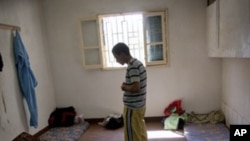A U.N. report warns that Libya’s former rebels hold some 7,000 detainees from the recent conflict in prisons and makeshift detention centers, where many have been badly treated and denied their legal rights.
The report from U.N. Secretary-General Ban Ki-moon says the detainees are in facilities which are mostly under the control of the revolutionary brigades. He notes that some detainees have reportedly been subjected to torture and ill treatment and denied due process.
Sub-Saharan Africans, many of whom were migrant workers suspected of being mercenaries hired by the former regime of Moammar Gadhafi, constitute a large number of those detained. The report says many of them have been reportedly targeted on the basis of their skin color alone.
Mr. Ban’s envoy to Libya, Ian Martin, told the Security Council Monday that the new Libyan authorities do not deny there have been human rights abuses. “It is indicative of the difference of the attitudes of the past regime that there is no denial that human rights are being violated and in most cases international organizations are granted access to detainees," he said.
Martin said the newly appointed interim government must show that correcting this problem is a top priority.
The U.N. envoy also highlighted what he said is Libya’s most immediate challenge - security. “The new minister of defense has the task of shaping a new army, integrating regular military who fought for the revolution and new brigades formed largely of civilians, and while doing so to manage tensions among them," he said.
Martin said the brigades currently provide public security, even as the ranks of police grow. But he said the brigades can also be a threat to public security because of undisciplined elements among them and he noted the recent security incidents in the capital, Tripoli.
Libya recently installed a new interim government which will tackle these and other challenges until elections for a national congress are held next June.
UN: Former Rebels Hold 7,000 Detainees in Libya




